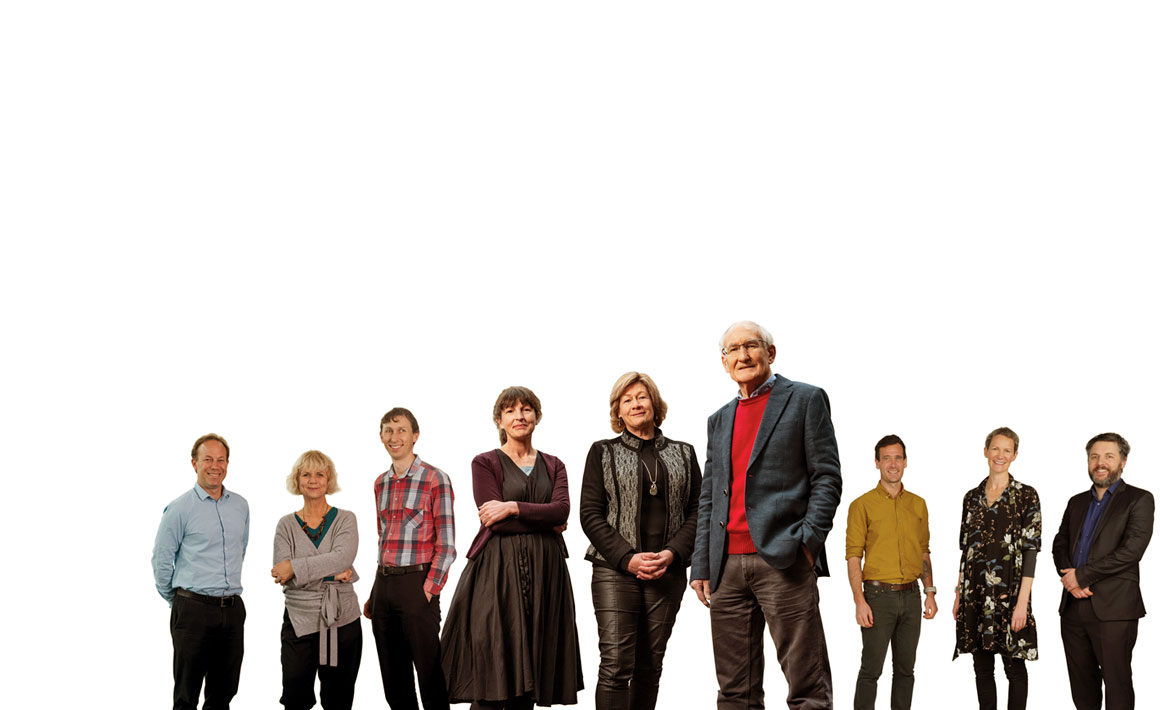 Dr Ben Beaglehole, Associate Professor Caroline Bell, Dr Jonathan Williman, Dr Charlene Rapsey, Professor Janet Hoek,Emeritus Professor Phil Gendall, Dr Matthew Jenkins, Dr Susanna Every-Palmer, Associate Professor James Stanley.
Dr Ben Beaglehole, Associate Professor Caroline Bell, Dr Jonathan Williman, Dr Charlene Rapsey, Professor Janet Hoek,Emeritus Professor Phil Gendall, Dr Matthew Jenkins, Dr Susanna Every-Palmer, Associate Professor James Stanley.While most New Zealanders coped well with being in lockdown during COVID-19 Alert Level 4, almost a third experienced high levels of mental distress, well above normal levels, researchers from the University of Otago have found.
The impact of lockdown on mental health has been surveyed by academic staff from three University campuses – Dunedin, Wellington and Christchurch – and is led by the head of the Department of Psychological Medicine in Wellington, Dr Susanna Every-Palmer, and research fellow Dr Matthew Jenkins.
Every-Palmer says the researchers were drawn to this area of study after finding much of the discussion about the country's stringent 33-day lockdown was dominated by its likely economic consequences.
“Clinically a number of us work with vulnerable people and we were seeing many people struggling with the pandemic and the lockdown, and experiencing anxiety, depression and loneliness so we were interested in what was happening at a population level.”
The researchers conducted an online survey of adult New Zealanders between 15 and 18 April, corresponding to Alert Level 4 lockdown days 19 to 22.
They asked Kiwis about their levels of stress, anxiety and depression, and about the state of their family relationships and whether there were any positive outcomes from lockdown.
Every-Palmer says one of the surprises was how well older people responded to the lockdown, with those over 65 the least distressed.
“We had identified older people as a priority group, because they were more at risk from COVID-19 and they may be less digitally connected. But it was the 65-plus group that was doing the best.”
“Clinically a number of us work with vulnerable people and we were seeing many people struggling with the pandemic and the lockdown, and experiencing anxiety, depression and loneliness so we were interested in what was happening at a population level.”
Every-Palmer says this might be related to the fact that older people have lower baseline levels of distress and often report themselves to be more content with life. They were also less likely to have lost jobs and be financially impacted by lockdown.
“Many older people wrote about their gratitude for the measures that New Zealand had taken.”
It was younger adults between the ages of 18 and 34 who reported being most distressed and Every-Palmer says this may reflect more stress in their lives, worries over work and money, or struggles juggling childcare.
Most of those surveyed enjoyed having more time to spend with their families and said their family relationships were better than usual.
“They also appreciated being able to stay in touch with their family using digital technology. Three-quarters found it easy to maintain contact with family and friends outside their home during lockdown. And this reflects lots of people using Skype, FaceTime, Teams Meetings, Zoom – maybe things they'd not used before.”
She says New Zealand provided a unique environment for the study, with the country going into lockdown without widespread community transmission of COVID-19, with less likelihood of death or illness compared to other countries.
It was still a time of much uncertainty, however.
“At the time, we didn't know that we weren't going to have widespread COVID-19, so people were also worried… 'what if I get sick? what if my elderly Mum who has been on chemotherapy gets sick?' At the time we collected the data, those anxieties were still high.”
The researchers will use the same survey to continue to track people's well-being over the next year, with the first survey in lockdown providing a snapshot of a unique time in our history.
Every-Palmer says the findings of the study emphasise the need for governments to put resources into supporting people's well-being during a pandemic and to have a psychosocial action plan.
She says, though, that the New Zealand government's emphasis on kindness to others was helpful in protecting Kiwis' mental well-being. “Messages about being kind and tolerant support mental well-being. And other countries can learn from that as well.”
Just as lockdown drew some families closer together, Every-Palmer says it also broke down some geographical silos, allowing the team of nine academics from Wellington, Christchurch and Dunedin to work together on the research.
“We had people from different departments in the three different schools all meeting and working together by Zoom and email. We have never had a meeting in the same room.”
The researchers are: Drs Every-Palmer and Jenkins (Psychological Medicine, Wellington); Associate Professor James Stanley, Professor Janet Hoek and Emeritus Professor Phil Gendall (Public Health, Wellington); Dr Ben Beaglehole and Associate Professor Caroline Bell (Psychological Medicine, Christchurch); Dr Jonathan Williman (Population Health, Christchurch); and Dr Charlene Rapsey (Psychological Medicine, Dunedin).
Funding
University of Otago